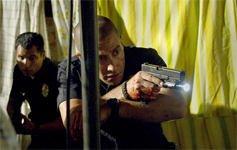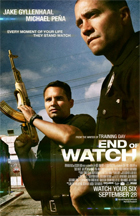End of Watch
|  David Ayer’s End of Watch is a potentially powerful story about the lethal daily grind of patrolling South Central Los Angeles that is wrecked by misguided aesthetics. Ayer, who grew up in South Central and is best known as the screenwriter of The Fast and the Furious (2001), Training Day (2001), and Dark Blue (2002), has forged much of his career depicting the harsh environs of L.A.’s most crime-ridden areas and corrupt seats of power. He has an intuitive sense of the omnipresence of urban danger and the virus-like nature of poverty and crime, and his screenplay for End of Watch evinces a fascination with the detailed in’s and out’s of policework and the tense relationship patrol officers have with the mean streets they are sworn to protect (in this regard, it is similar to Dennis Hopper’s Colors from 1988). David Ayer’s End of Watch is a potentially powerful story about the lethal daily grind of patrolling South Central Los Angeles that is wrecked by misguided aesthetics. Ayer, who grew up in South Central and is best known as the screenwriter of The Fast and the Furious (2001), Training Day (2001), and Dark Blue (2002), has forged much of his career depicting the harsh environs of L.A.’s most crime-ridden areas and corrupt seats of power. He has an intuitive sense of the omnipresence of urban danger and the virus-like nature of poverty and crime, and his screenplay for End of Watch evinces a fascination with the detailed in’s and out’s of policework and the tense relationship patrol officers have with the mean streets they are sworn to protect (in this regard, it is similar to Dennis Hopper’s Colors from 1988).However, Ayer made the decision to tell his story in an awkward mixture of rough-and-tumble documentary-like aesthetics and faux found footage via a character’s videocamera and the dash cams on various squad cars. The idea is to create an in-the-moment aesthetic experience, but it never quite works because Ayer doesn’t commit to an approach, but instead applies whatever might work whenever it’s most convenient (unlike other “found footage” films, he doesn’t even attempt to sustain the illusion). Thus, we get sweeping helicopter shots of the city mixed with video footage taken from any number of bizarre perspectives (sometimes we’re looking straight up at the characters as they walk, while at other times the camera is mounted on the ends of their guns looking back at them). That some of the point-of-view shots are reminiscent of first-person shooter games is particularly unfortunate since they have the effect of decimating whatever sense of verisimilitude the film had generated. The first-person footage does play a narrative role in that it allows the characters to speak directly to the audience and provide motivated background information about policework, but it often comes at the expense of dramatic continuity. Thus, despite generating isolated moments of effectiveness, the overall aesthetic approach is too much of a mish-mash to work, drawing away from the drama by drawing too much attention to itself. Form and function don’t quite coalesce. Jake Gyllenhaal and Michael Peña, who star as Brian Taylor and Mike Zavala, squad car partners and best friends who have known each other since their days at the police academy, are the best thing in the film. Gyllenhaal and Peña convey the nuances of a robust, lived-in friendship that has been tested time and time again and not only survived, but been strengthened by the fire. They have the coarse language of people under constant stress and they play up their macho posturing as a defense against fear. But, they also express genuine endearment, often through ribbing and bickering, whether it be about their relationships with their respective girlfriend (Anna Kendrick) and wife (Natalie Martinez) or the stereotypes associated with their races (“Have fun doing white people stuff,” Mike tells Brian when he informs him that he’s taking his girlfriend to the symphony, while Brian chides Mike for his extended Hispanic family and never-ending onslaught of quinceañeras). Unlike the forced aesthetics, Gyllenhaal and Peña’s characters feel organic and real. There is not so much a plot in the film as there is a series of events that chart a year in Mike and Brian’s life patrolling the streets. We see them in the police station getting crossways with Van Hauser (David Harbour), a particularly cynical and embittered police officer, and we follow them in their squad car as they joke, argue, and reminisce (most of these moments are shot in a way that approximates the dashboard cams used in reality TV shows). Through both their own tenacity and sheer luck Brian and Mike interrupt the operations of a particularly brutal Mexican drug cartel that is moving some of its operations to Los Angeles, which allows the film to digress into commentary about the increasingly brutal nature of the drug trade and the shifting racial dimensions of South Central. They become targets of the cartel, whose main enforcers we meet in several earlier scenes that are also conveyed primarily via video footage supposedly being shot by one of the characters. The overall effect is one of looming disaster, as we sense that Brian and Mike, despite being tested veterans, are moving into territory they can’t deal with on their own. While the trailers suggested otherwise, End of Watch is unabashedly on the side of the LAPD. A speech early on by Captain Reese (Jaime FitzSimons) makes it clear that corruption of any kind will not be tolerated, and both Brian and Mike are depicted as fundamentally decent, honest, and brave men putting themselves in the line of fire daily. They joke about killing criminals and question their own heroism after saving several children from a housefire, but they are never presented as anything other than upstanding men trying to do they best they can in a job that is constantly stacked against them. Ayer doesn’t pull any punches in terms of depicting the dangers of policework in South Central, and the film has a genuine sense of humanity in the way it allows its protagonists to be tough and gritty enough to do the work, but not so much that they can’t be human and humane when it’s called for. If only Ayer hadn’t tried to punch up the film with so much needless reality-TV-derived aesthetic overkill and played the material straight, End of Watch might have been a truly powerful dramatic experience. Copyright ©2012 James Kendrick Thoughts? E-mail James Kendrick All images copyright © Open Road Films |
Overall Rating: 

 (2.5)
(2.5)


